May/June 2021
Dear Friends,
We hope that this publication of the Fellows’ Flyer finds you and your family well.
The past two months have been an exciting time for PiAf. Our current Fellows are only a few months away from completing their remote fellowships. Although it’s been a challenging year, our Fellows have nonetheless made the most out of their experiences and report having gained skills that will prepare them for the next chapter of their lives.
Our host organizations have also had positive feedback about our Fellows’ impact. All 16 PiAf host organizations submitted the 6-month supervisor report and 100% of those who have responded to the survey describe the quality of their Fellow’s work with a positive rating (69% answered “excellent” and 31% answered “good”). 100% of organizations have said their Fellow has found ways to be creative and create value within the team (62.5% answered “strongly agree” and 37.5 answered “agreed”). All of the organizations agree that the Fellow’s skills and experience match with the needs of their role within the organization (62.5% answered “strongly agree” and 37.5% answered“agree”). Lastly, 62.5% of organizations said they are very satisfied with their Fellow and 37.5% said they are satisfied with their Fellow.
As the 2020-21 Fellows are nearing the end of their Fellowship, we have had the pleasure of inducting our new cohort, the 2021-22 PiAf Fellows. All 24 Fellows, staff and alumni met during a 3-day virtual orientation in early June. We engaged in various breakout sessions detailing pertinent information about the Princeton in Africa fellowships, useful skillsets and guidance on navigating the upcoming year. We have an incredibly diverse and experienced cohort coming from various backgrounds. Our Fellows, who will begin their fellowships remotely, will be supporting 15 orgs, in 9 countries including new organizations Alliance of Bioversity International and CIAT, American Leprosy Missions, Emerging Public Leaders and Mount Elgon Ecosystem Trust (MEET).
The next few months will be an important transitional period for PiAf and we look forward to all the changes in store. We want to thank all of the alumni, donors, and friends who offer continuous support to the Fellows and host organizations.
Warm regards,
Jodi & the PiAf Staff
PiAf Connections
Please click below to check out pictures of our Fellows, Alums and other members of the PiAf family meeting up at home and around Africa.
Notes from the Field
By Livia Karoui, '2020-2021' Fellow with BIPAI in Botswana
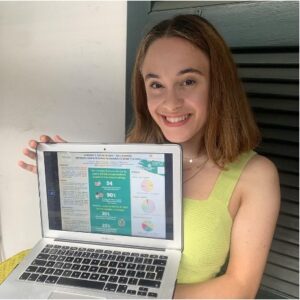
My virtual BIPAI RAISE poster session!
Hello from Italy! I am writing this at the end of my workday, and I simply cannot believe I only have 2 more months left of the fellowship; it really feels like yesterday when I first ‘met’ my co-fellows on Zoom! The past 10 months have been an incredible learning experience, and while it was not the fellowship I had envisioned when I first applied for PiAf during my senior year, it’s been rewarding and fulfilling nonetheless. Starting the fellowship was definitely nerve-racking as I am the only member of staff at Baylor-Botswana working remotely, but my coworkers all made me feel welcome and connected! Whatsapp has been such a great tool for remaining connected with people at Botswana-Baylor and
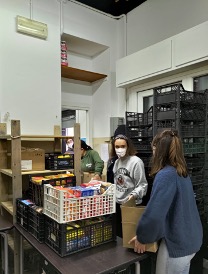
After work and on the weekends, I have been volunteering with a local non-profit that runs a food bank, a legal support and immigration services and after-school activities for children and families.
has allowed us to get to know each other beyond our work too (I have sent many pictures of my cat, Luce, to my colleagues, and she has also featured in many zoom calls!) Being able to stay connected was very important for my role as a program coordinator at Botswana-Baylor. My job is focused on making sure psychosocial support programs for adolescents living with HIV run in a way that helps our members stay connected with us and one another and feel supported, even if it’s through a Whatsapp message or call.
One of the most rewarding aspects of my job has been helping to transition Baylor adolescent programs to remote delivery. It took a lot of trial and error and Whatsapp messages between me and my colleagues to figure out what works best to engage teenagers remotely. I am proud to say that, thanks to memes, TikToks, and voice notes, we have been able to discuss topics such as relationships, healthy eating and exercise, and mental health with TeenClub members. Similarly, I have been responsible for changing and adapting the Tutoring Program that Baylor runs for adolescents who are facing challenges at school. I have been able to work with professors from Botho University to create a new virtual program and recruit current students there to work as volunteer tutors.
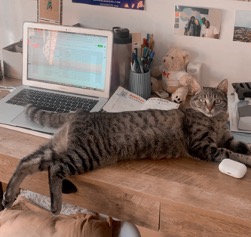
Luce helping me with tutoring data cleaning.
Since we started, we have enrolled 15 tutees and hosted over 50 one-on-one tutoring sessions that use text and Whatsapp messages as well as phone calls to offer personalized academic support. In fact, it’s gone so well that I’ll be presenting it at the BIPAI-network RAISE conference next week! Overall, the Teen Leaders, tutors, and volunteers have all been great team-workers and have helped us Baylor staff to make sure that these programs run smoothly, and I’ll be forever thankful to them (and will forever wish we could all celebrate our successes together!). I am excited to see what the last few weeks of my fellowship entail, and sad that it’s all coming to an end soon. I will cherish my relationships with my coworkers at Botswana-Baylor forever and I can’t wait for the day I’ll be able to visit my host country and meet them in person (hopefully soon!).
Notes from the Field
By Katerina Kakkis, '2020-2021' Fellow with IRC in Kenya
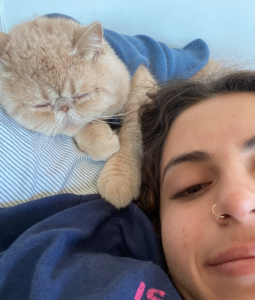
I love waking up to this lil’ guy. He is always up with me for my early (or VERY late) calls!
Greetings from Washington DC! I hope everyone finds themselves safe and healthy as they read this.
I cannot believe there are only two months left in my fellowship at the International Rescue Committee (IRC) in Kenya. I am the Communications and Donor Relations Fellow at IRC Kenya and work with another PiAf Fellow, Isaac. Going into this fellowship, I did not know what exactly to expect from my role. So far, I have taken on a range of responsibilities. Some are spontaneous, smaller tasks such as editing stories for donor reports or gathering content for RescueNet (IRC’s internal website). Others are larger, like helping coordinate a video on the IRC’s vaccine campaign at Kakuma Refugee Camp or working on a communications strategy plan. I am grateful for each opportunity.
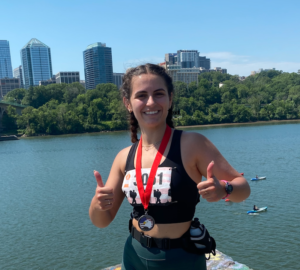
Right after finishing the half marathon in Georgetown, Washington DC. Apparently, Dr. Fauci was taking a stroll on the same path we were running!
The wide range of tasks has allowed me to engage with colleagues working across all seven of IRC Kenya’s offices and with colleagues in other parts of the continent and world. I have found guidance and support from my wonderful supervisor and communications staff at the regional level. Hopefully one day I will get to meet them. While it is difficult to do communications work remotely (as I constantly rely on others to gather stories/content), I deeply appreciate the conversations and reflections that have been spurred by this work.
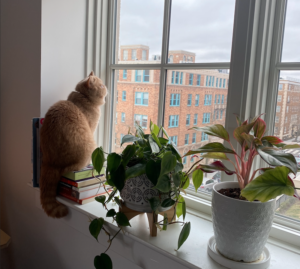
The view from my workplace. This is my roommate’s cat, Pote. He loves to keep me company.
In my free time, I work at a fermented foods store at the farmer’s market. If you ever find yourself looking for fermented foods in DC, come visit me at Number 1 Sons at Columbia Heights Farmers’ Market on the weekend. Fermented foods have been staples in many cuisines across the globe for thousands of years! One Kenyan fermented food is Uji, which is a fermented porridge. You can read more about it and find a recipe here (https://mayuris-jikoni.com/2018/04/25/7579/). I have also been doing citations for a friend’s upcoming book and volunteering with some legal aid organizations. I recently jogged my first half-marathon and joined a kickball team, as well. Thank you for reading!
Notes from the Field
By Marco Kull, '2020-2021' Fellow with eleQtra in US/Uganda/Mozambique
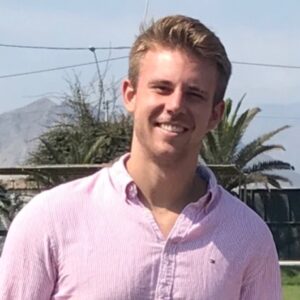 Greetings to all from the shores of Lake Geneva, Switzerland, where I have spent the most recent part of my Princeton in Africa fellowship. Since August of last year, I have been working with eleQtra, a private Sub-Saharan Africa-focused clean energy, and transport infrastructure developer. My time so far has been occupied with both leading and supporting the development of a number of projects across the continent, particularly in Zambia, Ghana, and Mozambique. I’ve been lucky enough to witness and eventually drive the full spectrum of stages in the project development process, spend time in both the energy and transport spaces, and also interface with a diverse set of investors from across the continent and the world.
Greetings to all from the shores of Lake Geneva, Switzerland, where I have spent the most recent part of my Princeton in Africa fellowship. Since August of last year, I have been working with eleQtra, a private Sub-Saharan Africa-focused clean energy, and transport infrastructure developer. My time so far has been occupied with both leading and supporting the development of a number of projects across the continent, particularly in Zambia, Ghana, and Mozambique. I’ve been lucky enough to witness and eventually drive the full spectrum of stages in the project development process, spend time in both the energy and transport spaces, and also interface with a diverse set of investors from across the continent and the world.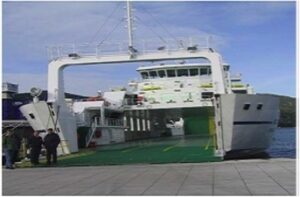
Roll-on / Roll-off ferry from a project on Lake Victoria
Though I started my fellowship with a few years of experience in finance, it has been eye-opening (and often quite challenging) to reconcile the theory in a project – from a macro and modeling perspective, but also in terms of timelines and management of expectations from investors and other stakeholders – with the realities of getting things built, built on time, and built well. Luckily, eleQtra has been doing just that for years, and I have been endlessly grateful for the mentorship and wisdom of my colleagues as we work together to bring impactful projects to the communities and economies in which we operate. The depth of knowledge, versatility, and resilience of, in particular, the local country managers in confronting all manner of challenges is truly extraordinary, and something I would be proud to emulate one day.

Barges from one of our lake transport projects
I should also emphasize the role alumni have played in my fellowship experience so far – previous eleQtra Fellows have been instrumental in helping to guide and contextualize my work. I’m happy to have managed to meet in person with both coworkers and alumni, even in a year where bouncing ideas around in a bar was a bit harder than usual.
All in all, a great year so far, with plenty of lessons learned and seeds planted for more in the future. I’m looking very much forward to keeping abreast of the plentiful successes of my colleagues, my co-Fellows, and future cohorts over the coming years.
Notes from the Field
Interview with Philile Shongwe, 2016-17 PiAf Alumna and D-Prize Recipient
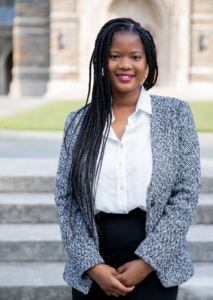
Founder and Executive Director at Govuka
2016 – 2017 Fellow with African School of Economics, Benin
Yale University Class of 2016
Duke University of Sanford School of Public Policy, Master of International Development Policy Candidate
Rotary Peace Fellow
What inspired you to get into the field of development?
“My first focus was always education and development. I saw education as a specific area that can take a really bad situation and make it better. I always thought I was going to be a teacher or an educator and influence education policy because many people need the education they deserve so they can help their communities. That’s what has kind of driven me. I moved into a more technical background measuring impact and working with NGOs and I started asking, “How do we say that what we are making a difference? What makes us believe that by doing this, we are achieving that?” I started thinking more about those questions and after years of helping others answer these questions, I felt like I wasn’t doing anything myself. I started thinking about how I am going to use all these lessons I’ve learned to do something myself and be more action-orientated about the problems and challenges that I see. That’s why development has made so much sense to me. And obviously, Eswatini lends itself to so many opportunities to serve.”
What interested you in fitting in social enterprise in your studies and what role do you see it playing on the continent of Africa?
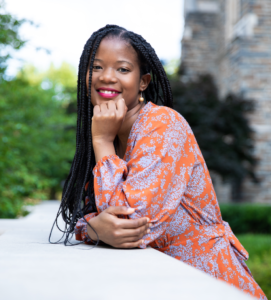 “The reason I thought I could become a social entrepreneur was this yearning to do something. As a single entity, this is the best option – to think of yourself as an entrepreneur, someone who decides to take a leap of faith on an idea. That’s kind of how I think of entrepreneurship. I always thought I’m not prepared for it but when the pandemic hit, I was feeling more inspired to take action. I thought this is the time, I’m home for 10 months why don’t I actually do this. I think social entrepreneurship on the continent may be the best option because right now, the youth’s sense of value is tied to jobs and income. However, in many places in Africa, there are not enough jobs in the market for those who are qualified. Entrepreneurship, although not perfect, is a good way to harness the energy that young people have to create jobs and opportunities. It’s not easy, but I would support any entity that is making that option desirable to people.”
“The reason I thought I could become a social entrepreneur was this yearning to do something. As a single entity, this is the best option – to think of yourself as an entrepreneur, someone who decides to take a leap of faith on an idea. That’s kind of how I think of entrepreneurship. I always thought I’m not prepared for it but when the pandemic hit, I was feeling more inspired to take action. I thought this is the time, I’m home for 10 months why don’t I actually do this. I think social entrepreneurship on the continent may be the best option because right now, the youth’s sense of value is tied to jobs and income. However, in many places in Africa, there are not enough jobs in the market for those who are qualified. Entrepreneurship, although not perfect, is a good way to harness the energy that young people have to create jobs and opportunities. It’s not easy, but I would support any entity that is making that option desirable to people.”Can you tell us about the inspiration and model for Govuka and how you hope it will impact Eswatini?
“At the very core of it is this idea that there’s an opportunity to influence how young women view dating and sexuality in the country. Part of it is a reflection on how my experience was bewildering and confusing and really wanting to push the needle. These are all sensitive topics and are taboo within the culture, but on a personal level, I really think we need to go about it better. We can’t expect women to make better choices when the information they receive about these topics is limited. You’re just told “don’t do that”, there’s never a why or how, but they just assume that you’ll figure it out eventually. Eswatini has a really high teenage pregnancy rate and the highest rate of new HIV infections among young women. Compared to young boys at the same age, they get infected at more than double the rate so clearly there’s a problem that was screaming at me.”
The second thing is that I have a very data-driven background. For almost 3 years I’ve been working on implementing randomized controlled trials and I ran into a really good example in Kenya where they shared information on relative risk to young women which led to about a 60% decrease in teenage pregnancy. I knew that this is not being done in Eswatini and I thought what are the chances that we do this there and it really takes off. So I decided to submit my idea to D-Prize, which I actually heard about from PiAf through one of the emails. The more I talked to people on the ground, the more I thought this could be something. And the more I’ve been learning about the topic and the challenge, the more I became dedicated to the complexity of the problem and how much impact potential the solution could have. Our mission statement is we are trying to promote youth leadership through access to life-saving information. Ultimately this means by 2026 we are hoping to empower up to 20,000 girls with the knowledge and opportunities to take action to reduce teenage pregnancy and new HIV infections. What we’re doing is taking that core curriculum in Kenya and ideating a little bit more and contextualizing it. We’re also adding more of a peer-to-peer element and adding on a mentorship aspect because we believe the problems are peer-driven so we are crafting a solution that is peer-driven as well. Generally, our goal by 2026 is to see a 50% reduction in teenage pregnancy rates and new HIV infections. We also want to change the narrative around the blesser/blessee relationships [sugar baby and sugar daddy relationships] and change the narrative around the desirability of dating older men and highlighting the risk of these relationships.”
How did your PiAf fellowship inspire the path you chose to take today with your career and with the impact you want to make?
“One, I was a French geek, so I was really happy to be in Benin. Secondly, by some stroke of luck, I was involved in a research project that focused on measuring the effect of having supplementary female teachers on girls’ educational attainments and aspirations. This was the building block for the work I am doing now because I was leading a very in-depth qualitative study in the Benin context, but it did translate to the work I’m doing now. Thirdly, my fellowship helped shift my focus from being an educator to more of a researcher and a policy analyst because the school [African School of Economics] allowed you to participate in both teaching and research. It allowed me to make that jump and helped me over the years to be on the track and gain the expertise to be where I am now.”





